Monsanto's Ethical Culture: A BUSI 472 Case Study Analysis
VerifiedAdded on 2023/01/19
|5
|1354
|26
Case Study
AI Summary
This case study examines the ethical culture of Monsanto, focusing on its impact on stakeholders and the benefits and costs associated with genetically modified (GM) seeds. The analysis delves into how Monsanto maintains its ethical culture, including its interactions with farmers, its use of laboratories, and its consideration of environmental and health concerns. The study explores the advantages of GM seeds, such as pest resistance, and disadvantages, including environmental contamination. Furthermore, the case study addresses Monsanto's management of potential harm to plants and animals, particularly concerning products like Roundup. The study also touches upon the company's advertising practices and the ethical implications of its actions, referencing the use of patent laws and the role of investigators in maintaining ethical standards. The paper concludes with recommendations for the company to improve its ethical standing.
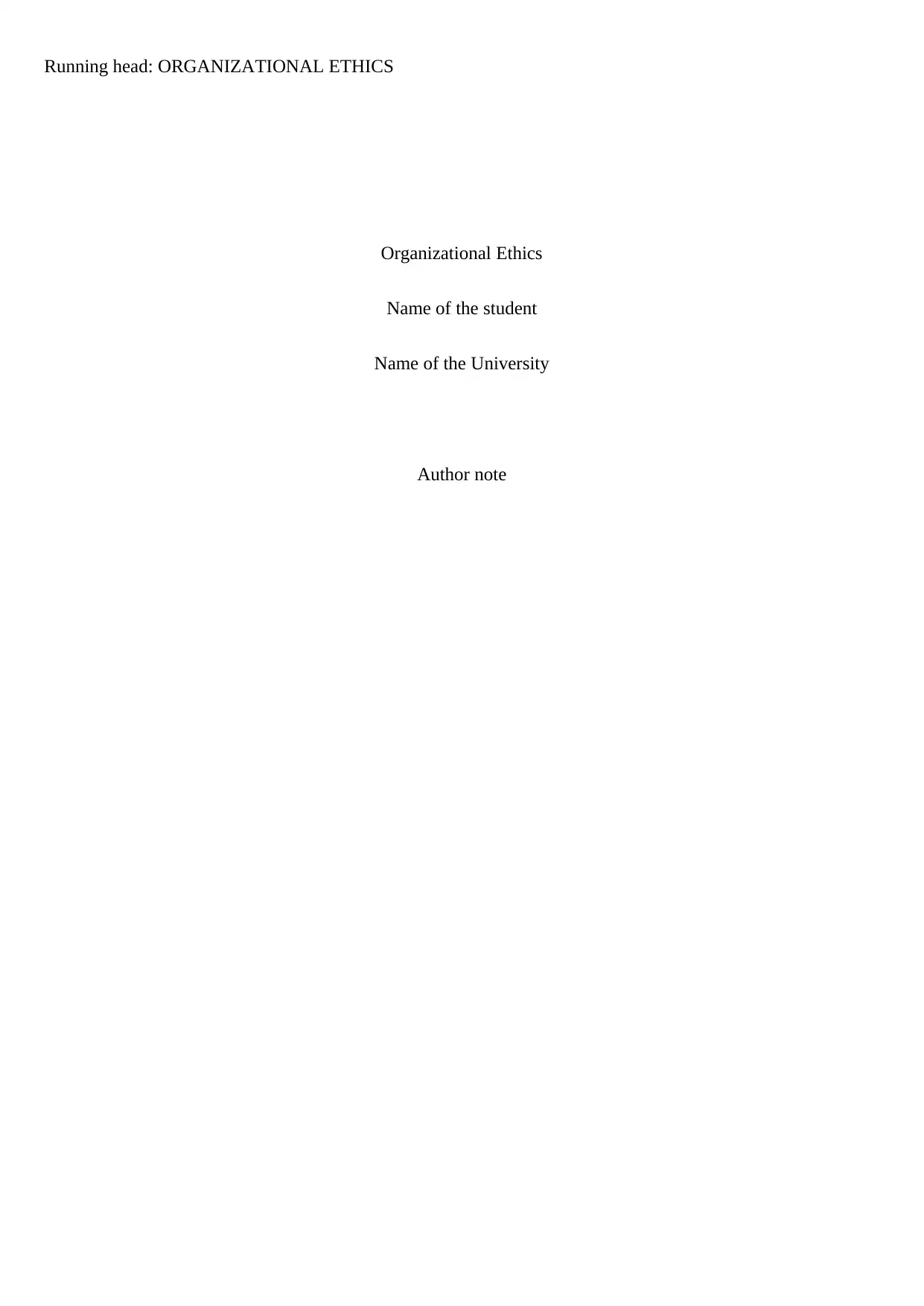
Running head: ORGANIZATIONAL ETHICS
Organizational Ethics
Name of the student
Name of the University
Author note
Organizational Ethics
Name of the student
Name of the University
Author note
Paraphrase This Document
Need a fresh take? Get an instant paraphrase of this document with our AI Paraphraser
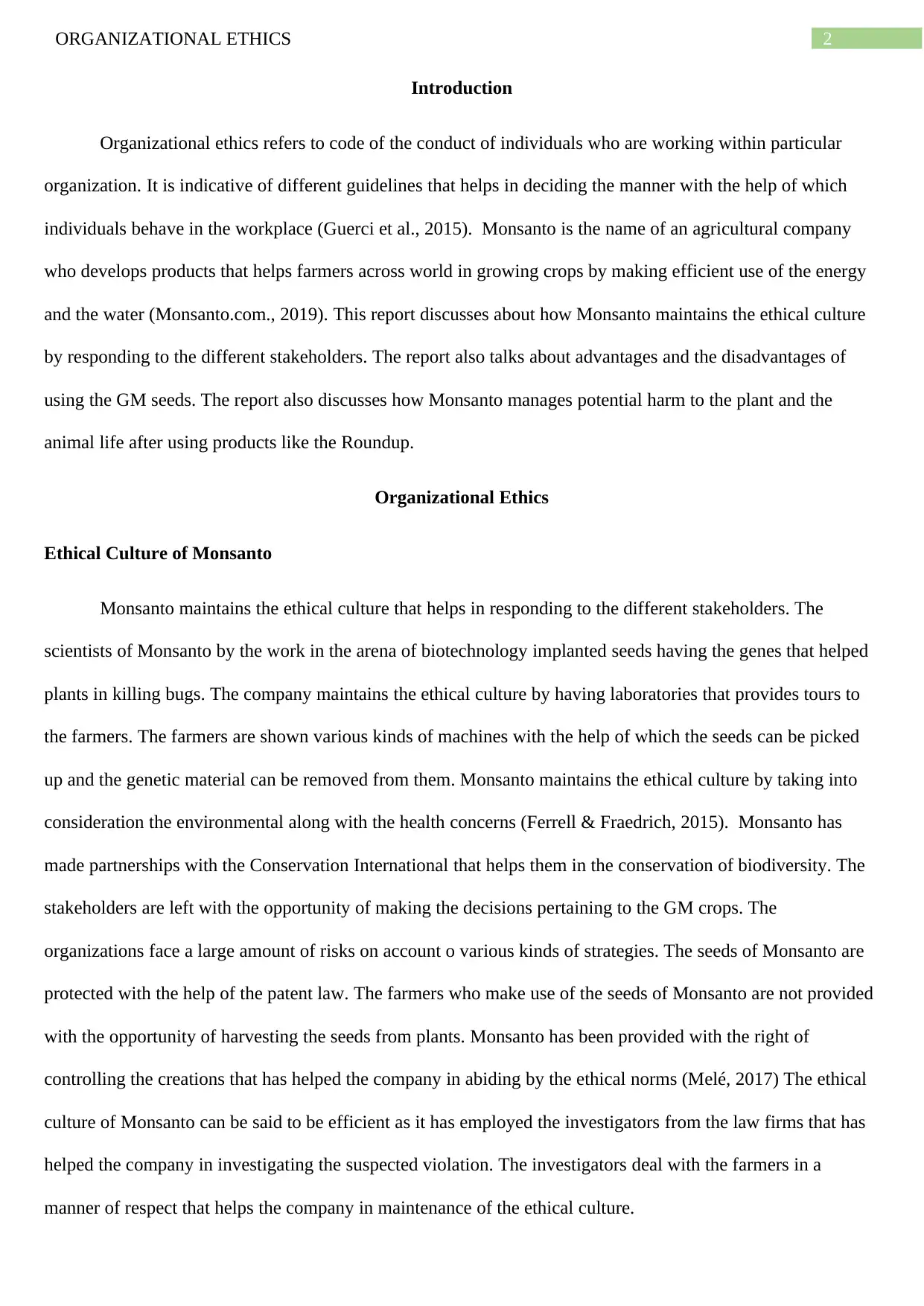
2ORGANIZATIONAL ETHICS
Introduction
Organizational ethics refers to code of the conduct of individuals who are working within particular
organization. It is indicative of different guidelines that helps in deciding the manner with the help of which
individuals behave in the workplace (Guerci et al., 2015). Monsanto is the name of an agricultural company
who develops products that helps farmers across world in growing crops by making efficient use of the energy
and the water (Monsanto.com., 2019). This report discusses about how Monsanto maintains the ethical culture
by responding to the different stakeholders. The report also talks about advantages and the disadvantages of
using the GM seeds. The report also discusses how Monsanto manages potential harm to the plant and the
animal life after using products like the Roundup.
Organizational Ethics
Ethical Culture of Monsanto
Monsanto maintains the ethical culture that helps in responding to the different stakeholders. The
scientists of Monsanto by the work in the arena of biotechnology implanted seeds having the genes that helped
plants in killing bugs. The company maintains the ethical culture by having laboratories that provides tours to
the farmers. The farmers are shown various kinds of machines with the help of which the seeds can be picked
up and the genetic material can be removed from them. Monsanto maintains the ethical culture by taking into
consideration the environmental along with the health concerns (Ferrell & Fraedrich, 2015). Monsanto has
made partnerships with the Conservation International that helps them in the conservation of biodiversity. The
stakeholders are left with the opportunity of making the decisions pertaining to the GM crops. The
organizations face a large amount of risks on account o various kinds of strategies. The seeds of Monsanto are
protected with the help of the patent law. The farmers who make use of the seeds of Monsanto are not provided
with the opportunity of harvesting the seeds from plants. Monsanto has been provided with the right of
controlling the creations that has helped the company in abiding by the ethical norms (Melé, 2017) The ethical
culture of Monsanto can be said to be efficient as it has employed the investigators from the law firms that has
helped the company in investigating the suspected violation. The investigators deal with the farmers in a
manner of respect that helps the company in maintenance of the ethical culture.
Introduction
Organizational ethics refers to code of the conduct of individuals who are working within particular
organization. It is indicative of different guidelines that helps in deciding the manner with the help of which
individuals behave in the workplace (Guerci et al., 2015). Monsanto is the name of an agricultural company
who develops products that helps farmers across world in growing crops by making efficient use of the energy
and the water (Monsanto.com., 2019). This report discusses about how Monsanto maintains the ethical culture
by responding to the different stakeholders. The report also talks about advantages and the disadvantages of
using the GM seeds. The report also discusses how Monsanto manages potential harm to the plant and the
animal life after using products like the Roundup.
Organizational Ethics
Ethical Culture of Monsanto
Monsanto maintains the ethical culture that helps in responding to the different stakeholders. The
scientists of Monsanto by the work in the arena of biotechnology implanted seeds having the genes that helped
plants in killing bugs. The company maintains the ethical culture by having laboratories that provides tours to
the farmers. The farmers are shown various kinds of machines with the help of which the seeds can be picked
up and the genetic material can be removed from them. Monsanto maintains the ethical culture by taking into
consideration the environmental along with the health concerns (Ferrell & Fraedrich, 2015). Monsanto has
made partnerships with the Conservation International that helps them in the conservation of biodiversity. The
stakeholders are left with the opportunity of making the decisions pertaining to the GM crops. The
organizations face a large amount of risks on account o various kinds of strategies. The seeds of Monsanto are
protected with the help of the patent law. The farmers who make use of the seeds of Monsanto are not provided
with the opportunity of harvesting the seeds from plants. Monsanto has been provided with the right of
controlling the creations that has helped the company in abiding by the ethical norms (Melé, 2017) The ethical
culture of Monsanto can be said to be efficient as it has employed the investigators from the law firms that has
helped the company in investigating the suspected violation. The investigators deal with the farmers in a
manner of respect that helps the company in maintenance of the ethical culture.
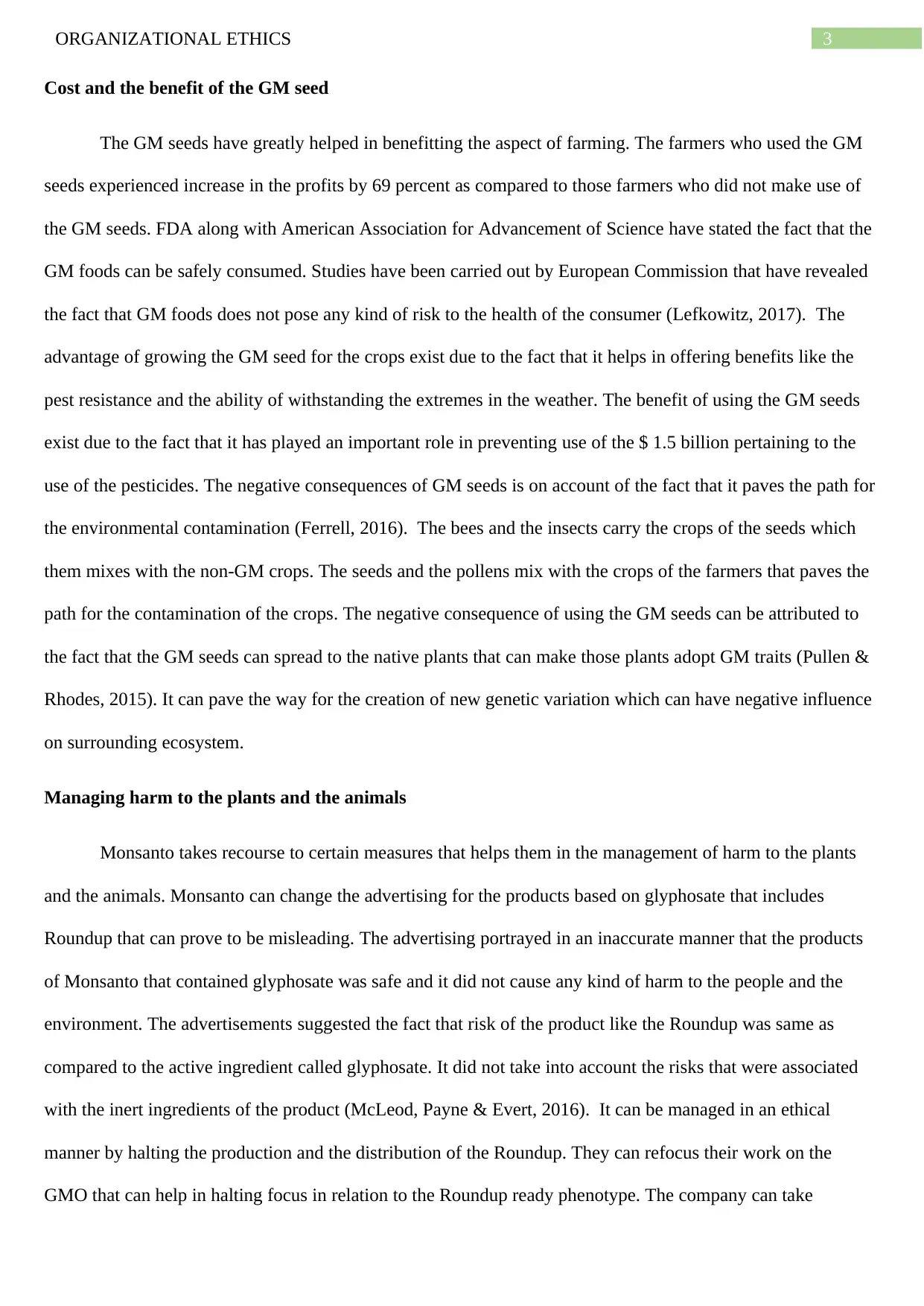
3ORGANIZATIONAL ETHICS
Cost and the benefit of the GM seed
The GM seeds have greatly helped in benefitting the aspect of farming. The farmers who used the GM
seeds experienced increase in the profits by 69 percent as compared to those farmers who did not make use of
the GM seeds. FDA along with American Association for Advancement of Science have stated the fact that the
GM foods can be safely consumed. Studies have been carried out by European Commission that have revealed
the fact that GM foods does not pose any kind of risk to the health of the consumer (Lefkowitz, 2017). The
advantage of growing the GM seed for the crops exist due to the fact that it helps in offering benefits like the
pest resistance and the ability of withstanding the extremes in the weather. The benefit of using the GM seeds
exist due to the fact that it has played an important role in preventing use of the $ 1.5 billion pertaining to the
use of the pesticides. The negative consequences of GM seeds is on account of the fact that it paves the path for
the environmental contamination (Ferrell, 2016). The bees and the insects carry the crops of the seeds which
them mixes with the non-GM crops. The seeds and the pollens mix with the crops of the farmers that paves the
path for the contamination of the crops. The negative consequence of using the GM seeds can be attributed to
the fact that the GM seeds can spread to the native plants that can make those plants adopt GM traits (Pullen &
Rhodes, 2015). It can pave the way for the creation of new genetic variation which can have negative influence
on surrounding ecosystem.
Managing harm to the plants and the animals
Monsanto takes recourse to certain measures that helps them in the management of harm to the plants
and the animals. Monsanto can change the advertising for the products based on glyphosate that includes
Roundup that can prove to be misleading. The advertising portrayed in an inaccurate manner that the products
of Monsanto that contained glyphosate was safe and it did not cause any kind of harm to the people and the
environment. The advertisements suggested the fact that risk of the product like the Roundup was same as
compared to the active ingredient called glyphosate. It did not take into account the risks that were associated
with the inert ingredients of the product (McLeod, Payne & Evert, 2016). It can be managed in an ethical
manner by halting the production and the distribution of the Roundup. They can refocus their work on the
GMO that can help in halting focus in relation to the Roundup ready phenotype. The company can take
Cost and the benefit of the GM seed
The GM seeds have greatly helped in benefitting the aspect of farming. The farmers who used the GM
seeds experienced increase in the profits by 69 percent as compared to those farmers who did not make use of
the GM seeds. FDA along with American Association for Advancement of Science have stated the fact that the
GM foods can be safely consumed. Studies have been carried out by European Commission that have revealed
the fact that GM foods does not pose any kind of risk to the health of the consumer (Lefkowitz, 2017). The
advantage of growing the GM seed for the crops exist due to the fact that it helps in offering benefits like the
pest resistance and the ability of withstanding the extremes in the weather. The benefit of using the GM seeds
exist due to the fact that it has played an important role in preventing use of the $ 1.5 billion pertaining to the
use of the pesticides. The negative consequences of GM seeds is on account of the fact that it paves the path for
the environmental contamination (Ferrell, 2016). The bees and the insects carry the crops of the seeds which
them mixes with the non-GM crops. The seeds and the pollens mix with the crops of the farmers that paves the
path for the contamination of the crops. The negative consequence of using the GM seeds can be attributed to
the fact that the GM seeds can spread to the native plants that can make those plants adopt GM traits (Pullen &
Rhodes, 2015). It can pave the way for the creation of new genetic variation which can have negative influence
on surrounding ecosystem.
Managing harm to the plants and the animals
Monsanto takes recourse to certain measures that helps them in the management of harm to the plants
and the animals. Monsanto can change the advertising for the products based on glyphosate that includes
Roundup that can prove to be misleading. The advertising portrayed in an inaccurate manner that the products
of Monsanto that contained glyphosate was safe and it did not cause any kind of harm to the people and the
environment. The advertisements suggested the fact that risk of the product like the Roundup was same as
compared to the active ingredient called glyphosate. It did not take into account the risks that were associated
with the inert ingredients of the product (McLeod, Payne & Evert, 2016). It can be managed in an ethical
manner by halting the production and the distribution of the Roundup. They can refocus their work on the
GMO that can help in halting focus in relation to the Roundup ready phenotype. The company can take
⊘ This is a preview!⊘
Do you want full access?
Subscribe today to unlock all pages.

Trusted by 1+ million students worldwide
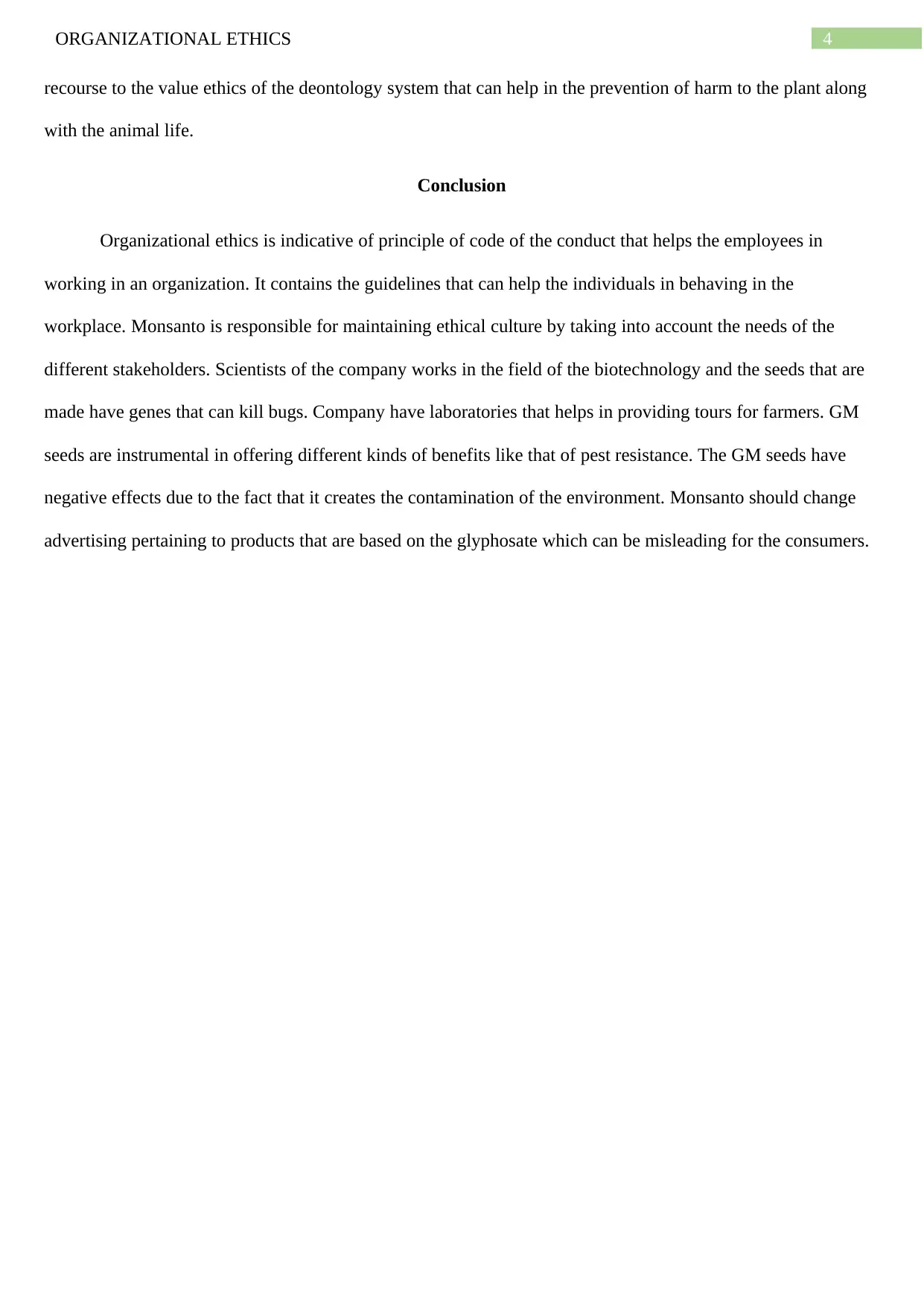
4ORGANIZATIONAL ETHICS
recourse to the value ethics of the deontology system that can help in the prevention of harm to the plant along
with the animal life.
Conclusion
Organizational ethics is indicative of principle of code of the conduct that helps the employees in
working in an organization. It contains the guidelines that can help the individuals in behaving in the
workplace. Monsanto is responsible for maintaining ethical culture by taking into account the needs of the
different stakeholders. Scientists of the company works in the field of the biotechnology and the seeds that are
made have genes that can kill bugs. Company have laboratories that helps in providing tours for farmers. GM
seeds are instrumental in offering different kinds of benefits like that of pest resistance. The GM seeds have
negative effects due to the fact that it creates the contamination of the environment. Monsanto should change
advertising pertaining to products that are based on the glyphosate which can be misleading for the consumers.
recourse to the value ethics of the deontology system that can help in the prevention of harm to the plant along
with the animal life.
Conclusion
Organizational ethics is indicative of principle of code of the conduct that helps the employees in
working in an organization. It contains the guidelines that can help the individuals in behaving in the
workplace. Monsanto is responsible for maintaining ethical culture by taking into account the needs of the
different stakeholders. Scientists of the company works in the field of the biotechnology and the seeds that are
made have genes that can kill bugs. Company have laboratories that helps in providing tours for farmers. GM
seeds are instrumental in offering different kinds of benefits like that of pest resistance. The GM seeds have
negative effects due to the fact that it creates the contamination of the environment. Monsanto should change
advertising pertaining to products that are based on the glyphosate which can be misleading for the consumers.
Paraphrase This Document
Need a fresh take? Get an instant paraphrase of this document with our AI Paraphraser
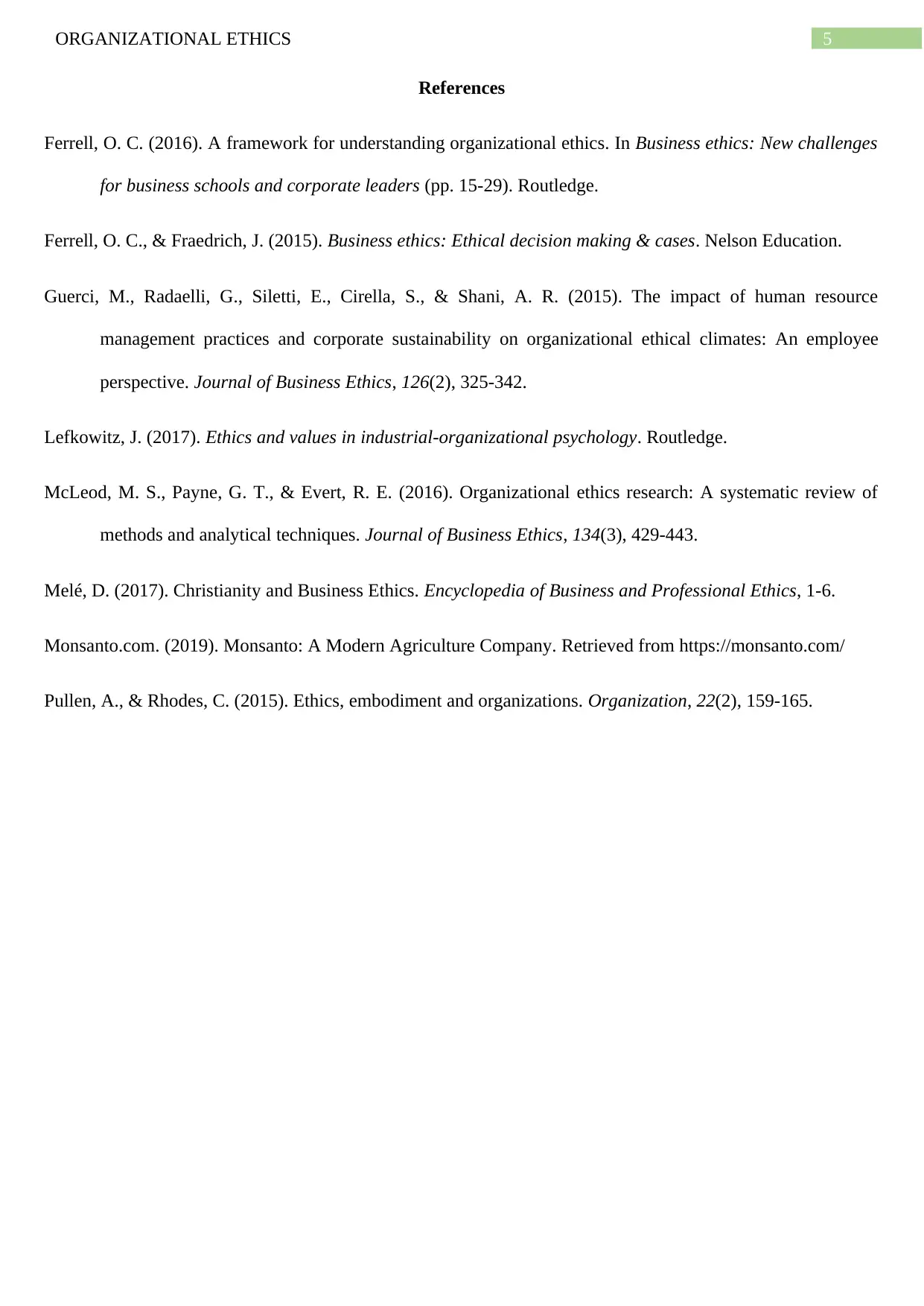
5ORGANIZATIONAL ETHICS
References
Ferrell, O. C. (2016). A framework for understanding organizational ethics. In Business ethics: New challenges
for business schools and corporate leaders (pp. 15-29). Routledge.
Ferrell, O. C., & Fraedrich, J. (2015). Business ethics: Ethical decision making & cases. Nelson Education.
Guerci, M., Radaelli, G., Siletti, E., Cirella, S., & Shani, A. R. (2015). The impact of human resource
management practices and corporate sustainability on organizational ethical climates: An employee
perspective. Journal of Business Ethics, 126(2), 325-342.
Lefkowitz, J. (2017). Ethics and values in industrial-organizational psychology. Routledge.
McLeod, M. S., Payne, G. T., & Evert, R. E. (2016). Organizational ethics research: A systematic review of
methods and analytical techniques. Journal of Business Ethics, 134(3), 429-443.
Melé, D. (2017). Christianity and Business Ethics. Encyclopedia of Business and Professional Ethics, 1-6.
Monsanto.com. (2019). Monsanto: A Modern Agriculture Company. Retrieved from https://monsanto.com/
Pullen, A., & Rhodes, C. (2015). Ethics, embodiment and organizations. Organization, 22(2), 159-165.
References
Ferrell, O. C. (2016). A framework for understanding organizational ethics. In Business ethics: New challenges
for business schools and corporate leaders (pp. 15-29). Routledge.
Ferrell, O. C., & Fraedrich, J. (2015). Business ethics: Ethical decision making & cases. Nelson Education.
Guerci, M., Radaelli, G., Siletti, E., Cirella, S., & Shani, A. R. (2015). The impact of human resource
management practices and corporate sustainability on organizational ethical climates: An employee
perspective. Journal of Business Ethics, 126(2), 325-342.
Lefkowitz, J. (2017). Ethics and values in industrial-organizational psychology. Routledge.
McLeod, M. S., Payne, G. T., & Evert, R. E. (2016). Organizational ethics research: A systematic review of
methods and analytical techniques. Journal of Business Ethics, 134(3), 429-443.
Melé, D. (2017). Christianity and Business Ethics. Encyclopedia of Business and Professional Ethics, 1-6.
Monsanto.com. (2019). Monsanto: A Modern Agriculture Company. Retrieved from https://monsanto.com/
Pullen, A., & Rhodes, C. (2015). Ethics, embodiment and organizations. Organization, 22(2), 159-165.
1 out of 5
Related Documents
Your All-in-One AI-Powered Toolkit for Academic Success.
+13062052269
info@desklib.com
Available 24*7 on WhatsApp / Email
![[object Object]](/_next/static/media/star-bottom.7253800d.svg)
Unlock your academic potential
Copyright © 2020–2026 A2Z Services. All Rights Reserved. Developed and managed by ZUCOL.





